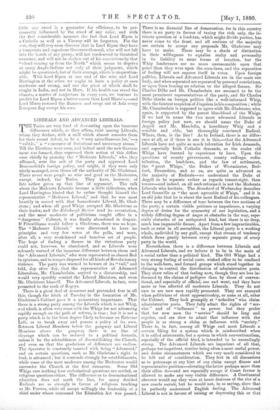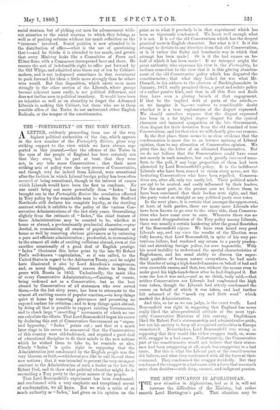LIBERALS AND ADVANCED LIBERALS.
THE Tories are very fond of descanting upon the immense differences which, as they affirm, exist among Liberals, whom they declare, with a sniff which almost consoles them for their recent defeat, to be a " very miscellaneous lot,"—a "rabble," a "concourse of fortuitous and unsavoury atoms." Till the Elections were over, and indeed until the new Govern- ment was formed, they expressed their notion of this differ- ence chiefly by praising the 'Moderate Liberals," who, they affirmed, were the salt of the party and approved Lord Beaconsfield's foreign policy, and might, if they were only nicely managed, even throw off the authority of Mr. Gladstone. There never were people so wise and good as the Moderates, except, indeed, the Tories. They have, however, of late rather given up that line of argument. The talk about the Moderate Liberals became a little ridiculous, when Lord Hartington hinted that he rather thought himself the representative "Moderate Liberal," and that he was most heartily in accord with that Immoderate Liberal; Mr. Glad- stone ; and when all good Whigs accepted Mr. Gladstone as their leader, and the Edinburgh Review read its recantation, and the most moderate of politicians sought office in a " dangerous " Cabinet, it was finally abandoned in despair. If Fitzwilliams would follow a Gladstone, there was no hope. The "Moderate Liberals" were discovered to have no principles and very few votes at the polls, and were, after all, a very weak-kneed and boneless set of people. The hope of finding a fissure in the victorious party could not, however, be abandoned, and so Liberals were solemnly warned of the immense difference between them and the "Advanced Liberals," who were represented as almost Red in opinions, and in temper disposed for all kinds of Revolutionary violence. The party was warned to beware of its "tail," and told, day after day, that the representative of Advanced Liberalism, Mr. Chamberlain, aspired to a dictatorship, and would very speedily control the Liberal Ministers, and even Mr. Gladstone himself. The Advanced Liberals, in fact, were promoted to the rank of Bogeys.
There is a great deal of nonsense and pretended fear in all this, though the hitch of Tuesday in the formation of Mr. Gladstone's Cabinet gave it a momentary importance. That there is a strong party among the Liberals which is not Whig, and which is often very cross with the Whigs for not advancing rapidly enough on the path of reform, is true ; but it is not a party which is in the least degree likely to become an Extreme Left, or to break away and pursue a policy of its own. Between Liberal Members below the gangway and Liberal Members above the gangway there is no line of cleavage which can be reduced to a political formula, unless it be the advisableness of disestablishing the Church, and even on that the gradations of difference are endless. The Spectator is constantly taunted with being "Advanced," and on certain questions, such as Mr. Gladstone's right to lead, is advanced ; but it contends strongly for establishments, while some of the most moderate among the Moderates would surrender the Church at the first summons. Some Old Whigs care nothing how ecclesiastical questions are settled, or religious questions either. The difference as to denominational education does not mark the line, for many decided Radicals are as strongly in favour of religious teaching as Mr. Forster, while all accept willingly the leadership of a chief under whose command the Education Act was passed. There is no financial line of demarcation, for in this country there is no party in favour of taxing the rich only, the in- tricate question of a land-tax, which might divide parties, has never come to the front, and all sections of the majority are certain to accept any proposals Mr. Gladstone may have to make. There may be a shade of distinction in their willingness to equalise realty and personalty in its liability to some forms of taxation, but the Whig landowners are no more unreasonable upon that point than they were upon the corn-laws, and the separation of feeling will not express itself in votes. Upon foreign politics, Liberals and Advanced Liberals are in the main one body, and when separated are separated by personal convictions, or upon lines bearing no relation to the alleged fissure. Sir Charles Dilke and Mr. Chamberlain are assumed to be the most prominent representatives of the party, and Sir Charles Dilke thinks on foreign politics like a well-informed Whig, with the faintest suspicion of Jingoism in his composition ; while Mr. Chamberlain is supposed to agree with Mr. Gladstone, who, again, is supported by the purest blue-blood of the Whigs. If we had to name the two most advanced Liberals in foreign policy just now, we should name the Duke of Argyll and Mr. Mundella, a hereditary Whig and a sensible and able, but thoroughly convinced Radical. Where, then, is the line ? As to Ireland, there is no differ- ence at all, or if there is one it is this,—that the Advanced Liberals have not quite so much toleration for Irish demands, and especially Irish Catholic demands, as the cooler old Whigs have learned by experience to have. Upon the questions of county government, county suffrage, redis- tribution, the land-laws, and the law of settlement, the "great Whigs," the Dukes of Westminster, Bed- ford, Devonshire, and so on, are quite as advanced as the majority of Radicals—we understand the Duke of Argyll to be separate rather as regards tenant-right, than tenure—and indeed, on all such reforms it is not the Moderate Liberals who hesitate. The Standard of Wednesday describes Lord Granville as "the most agreeable of Whigs," and it is an old joke that he is about the most Radical of his colleagues. There may be a difference of tone between the two sections of the party, a certain visible patience or impatience, a varying degree of desire for the symmetry of our legislation, and a widely differing degree of anger at obstacles in the way, espe- cially obstacles of an antiquated kind, but there is no deep, much less impassable fissure. Apart from a few impracticables, such as exist in all assemblies, the Liberal party is a working whole, undivided by any gulf, except that stream of tendency which flows gently between every separate group of every party in the world.
Nevertheless, there is a difference between Liberals and Advanced Liberals, and we believe it to be in the main of a social rather than a political kind. The Old Whigs had a very strong feeling of social caste, wished office to be confined to the well-born, and formed groups which stood together in claiming to control the distribution of administrative posts. They show relics of that feeling now, though they are less in- fluenced by the claims of pedigree than by those of conven- tional, and especially of official, use and wont, and they have more or less affected all moderate Liberals. They do not care to see new men rapidly promoted. They are annoyed when politicians of short apprenticeship, or none at all, enter the Cabinet. They look grumpily at " nobodies " who claim administrative posts. They fully admit the rights of " ser- vice " and of " influence " to power, but they prefer that for new men the " service " should be long and regular, and are slow to admit that influence with the people is as strong a claim as influence with "society." There is, in fact, among all Whigs and most Liberals a certain liking for a system which is misdescribed when it is called aristocratic, but a system in which conventionalism, especially of the official kind, is intended to be exceedingly strong. The Advanced Liberals are impatient of all that, perhaps too impatient, routine being often a most useful power, and desire circumstances which are very much considered to be left out of consideration. They fret in all discussions as to patronage at any hint of any claim except fitness and representative position—elevating the latter perhaps more than their allies do—and are especially savage if Court favour is allowed to make any very visible difference. A Continental observer would say they were at heart desirous of the rise of a new couche sociale, but he would not, in so saying, show that he perfectly understood English feeling. The Advanced Liberal is not in favour of raising or depressing this or that
social stratum, but of picking out men for advancement with- out attention to the social stratum to which they belong, as well as of pushing reforms without too much reflection on the "interests" involved. Social position is now attended to in the distribution of office—what is the use of questioning that I—and he thinks it is attended to too much, and growls that every Ministry looks like a Committee of Peers and Eldest Sons, with a Commoner interspersed here and there. He resents the sort of indefeasible right to office put forward by the Old Whigs, and admitted nine times out of ten by Cabinet- makers, and is not indisposed sometimes in that resentment to push forward his ideas a little more strongly than he other- wise would. But that disposition, which exists oven more strongly in the other section of the Liberals, where groups become coherent more easily, is not political difference, and does not incline men to political treachery. It would have been an injustice as well as an absurdity to forget the Advanced Liberals in making this Cabinet, but those who see in them possible allies of the Tories do not understand either English Radicals, or the temper of the constituencies.



































 Previous page
Previous page